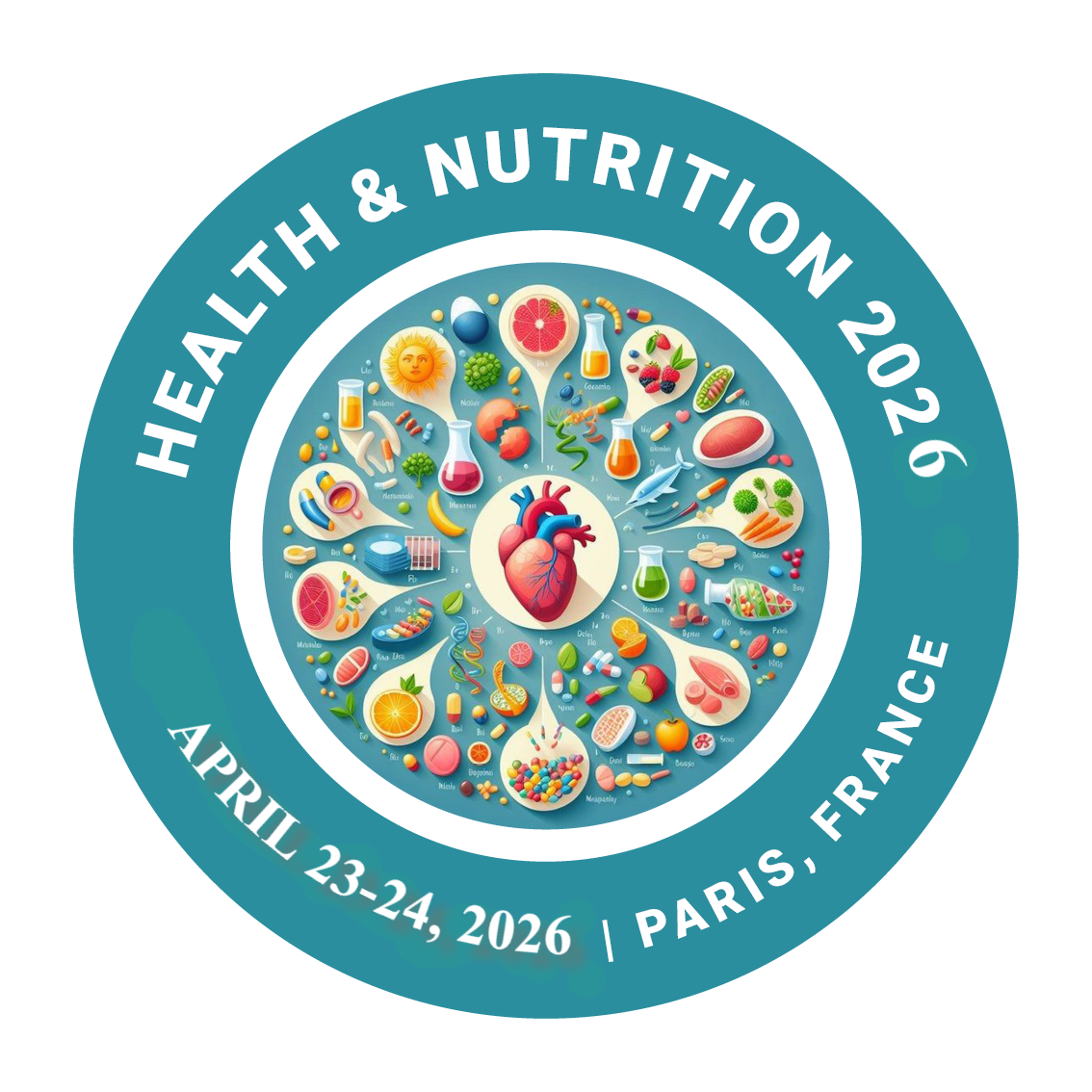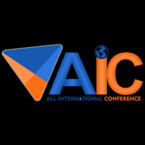Recommended Global Nutrition Webinars & Conferences
Europe & UK
Asia Pacific & Middle East
Canada
HEALTH & NUTRITION 2026
- Welcome Message
- About the Conference
- Benefits of Participation
- Session & Tracks
- Visa Application Process
- Market Analysis
- Past Conference Report
Welcome Message
Dear Delegates, Speakers, and Guests,
Welcome to the 8th World Summit on Health & Nutrition, taking place on April 23–24, 2026 in Paris, France.
We are thrilled to host this global platform uniting researchers, healthcare professionals, and policymakers to exchange insights and explore innovations in health and nutrition under the theme: “Innovations and Strategies for Global Health & Nutritional Well-being.”
As we face ongoing global health challenges, this summit offers a vital space for collaboration, knowledge sharing, and progress toward a healthier future. We also invite you to enjoy the vibrant culture and charm of Paris during your stay.
We look forward to a productive and inspiring event.
Warm regards,
Organizing Committee
HEALTH & NUTRITION 2026
About the Conference
The 8th World Summit on Health & Nutrition, scheduled for April 23–24, 2026 in Paris, France, is a global platform bringing together healthcare professionals, nutritionists, researchers, academicians, policymakers, and industry experts. The summit will focus on the latest developments and challenges in health and nutrition, emphasizing innovation, sustainable practices, and practical solutions to improve global health outcomes.
Conference Objectives
- Promote collaboration and dialogue across disciplines
- Share cutting-edge research and evidence-based practices
- Encourage innovation in public health and nutritional science
- Address current and emerging health and dietary challenges
- Support global efforts toward sustainable and inclusive nutrition
Who Should Attend?
- Clinical Nutritionists & Dietitians
- Public Health Experts
- Food & Nutrition Researchers
- Pediatricians and Geriatricians
- Sports & Fitness Nutrition Professionals
- Healthcare Policymakers
- Pharma & Nutraceutical Industry Professionals
- Academic Scholars and Students
- Wellness Coaches & Holistic Practitioners
Conference Highlights
- Renowned keynote speakers and panel experts
- Interactive workshops & live demonstrations
- Scientific sessions and poster presentations
- B2B networking and collaboration spaces
- Exhibitor showcases and product launches
- Recognition awards and speaker certificate
Benefits of Participation
Speaker Participation
- Present your research on a global stage
- Get published in conference proceedings
- Network with global experts
- Boost your academic profile
Delegate Participation
- Learn from top experts and sessions
- Receive participation certificates
- Engage in networking and discussions
- Stay updated on latest health & nutrition trends
Workshop Participants
- Gain hands-on skills from experts
- Receive a certified workshop certificate
- Learn practical tools & techniques
- Interact in small, focused groups
Sponsors Participation
- Enhance brand visibility
- Connect with target audiences
- Showcase leadership in the field
- Gain marketing and promotional benefits
Exhibitors
- Promote your products/services
- Interact directly with potential clients
- Generate business leads
- Build valuable partnerships
Session & Tracks
Track – 1: Public Health & Global Nutrition
Public health nutrition plays a critical role in promoting well-being across populations. This track explores nutritional policies, large-scale interventions, and public health strategies designed to address malnutrition, dietary-related diseases, and inequalities in food access worldwide.
Health Conferences | Nutrition Conferences | Global Health Summit 2026 | Clinical Nutrition Conferences 2026 USA | Public Health Conferences 2026 Europe | List of Health & Nutrition Conferences | Upcoming Nutrition Science Conferences
Related Societies and Associations:
Academy of Nutrition and Dietetics | American Society for Nutrition (ASN) | International Union of Nutritional Sciences (IUNS) | World Public Health Nutrition Association (WPHNA) | European Society for Clinical Nutrition and Metabolism (ESPEN) | British Nutrition Foundation (BNF) | International Confederation of Dietetic Associations (ICDA) | Dietitians Association of Australia (DAA) | Canadian Nutrition Society (CNS) | Federation of African Nutrition Societies (FANUS)
Track – 2: Clinical Nutrition & Therapeutics
Clinical nutrition focuses on applying nutritional science in healthcare settings to manage and treat disease. This track covers therapeutic diets, medical nutrition therapy, and dietary interventions for various clinical conditions, including cancer, diabetes, and gastrointestinal disorders.
Health Conferences | Nutrition Conferences | Global Health Summit 2026 | Clinical Nutrition Conferences 2026 USA | Public Health Conferences 2026 Europe | List of Health & Nutrition Conferences | Upcoming Nutrition Science Conferences
Related Societies and Associations:
Academy of Nutrition and Dietetics | American Society for Nutrition (ASN) | International Union of Nutritional Sciences (IUNS) | World Public Health Nutrition Association (WPHNA) | European Society for Clinical Nutrition and Metabolism (ESPEN) | British Nutrition Foundation (BNF) | International Confederation of Dietetic Associations (ICDA) | Dietitians Association of Australia (DAA) | Canadian Nutrition Society (CNS) | Federation of African Nutrition Societies (FANUS)
Track – 3: Nutritional Epidemiology
Nutritional epidemiology examines the links between diet and disease in populations. This session will highlight methodologies, dietary assessment tools, and the use of epidemiological data in developing guidelines and influencing public health policy.
Health Conferences | Nutrition Conferences | Global Health Summit 2026 | Clinical Nutrition Conferences 2026 USA | Public Health Conferences 2026 Europe | List of Health & Nutrition Conferences | Upcoming Nutrition Science Conferences
Related Societies and Associations:
Academy of Nutrition and Dietetics | American Society for Nutrition (ASN) | International Union of Nutritional Sciences (IUNS) | World Public Health Nutrition Association (WPHNA) | European Society for Clinical Nutrition and Metabolism (ESPEN) | British Nutrition Foundation (BNF) | International Confederation of Dietetic Associations (ICDA) | Dietitians Association of Australia (DAA) | Canadian Nutrition Society (CNS) | Federation of African Nutrition Societies (FANUS)
Track – 4: Functional & Medical Foods
Functional foods provide health benefits beyond basic nutrition, such as improving immunity or reducing disease risk. This track discusses bioactive compounds, probiotics, fortified foods, and clinical studies validating their therapeutic potential.
Health Conferences | Nutrition Conferences | Global Health Summit 2026 | Clinical Nutrition Conferences 2026 USA | Public Health Conferences 2026 Europe | List of Health & Nutrition Conferences | Upcoming Nutrition Science Conferences
Related Societies and Associations:
Academy of Nutrition and Dietetics | American Society for Nutrition (ASN) | International Union of Nutritional Sciences (IUNS) | World Public Health Nutrition Association (WPHNA) | European Society for Clinical Nutrition and Metabolism (ESPEN) | British Nutrition Foundation (BNF) | International Confederation of Dietetic Associations (ICDA) | Dietitians Association of Australia (DAA) | Canadian Nutrition Society (CNS) | Federation of African Nutrition Societies (FANUS)
Track – 5: Sports & Exercise Nutrition
Sports nutrition supports physical performance, endurance, and recovery. This session will examine energy balance, nutrient timing, hydration, and supplements tailored for athletes and active individuals across age and performance levels.
Health Conferences | Nutrition Conferences | Global Health Summit 2026 | Clinical Nutrition Conferences 2026 USA | Public Health Conferences 2026 Europe | List of Health & Nutrition Conferences | Upcoming Nutrition Science Conferences
Related Societies and Associations:
Academy of Nutrition and Dietetics | American Society for Nutrition (ASN) | International Union of Nutritional Sciences (IUNS) | World Public Health Nutrition Association (WPHNA) | European Society for Clinical Nutrition and Metabolism (ESPEN) | British Nutrition Foundation (BNF) | International Confederation of Dietetic Associations (ICDA) | Dietitians Association of Australia (DAA) | Canadian Nutrition Society (CNS) | Federation of African Nutrition Societies (FANUS)
Track – 6: Pediatric & Maternal Nutrition
Pediatric and maternal nutrition is essential for optimal growth, development, and long-term health. This track covers prenatal nutrition, breastfeeding, complementary feeding, and strategies to combat childhood malnutrition and developmental delays.
Health Conferences | Nutrition Conferences | Global Health Summit 2026 | Clinical Nutrition Conferences 2026 USA | Public Health Conferences 2026 Europe | List of Health & Nutrition Conferences | Upcoming Nutrition Science Conferences
Related Societies and Associations:
Academy of Nutrition and Dietetics | American Society for Nutrition (ASN) | International Union of Nutritional Sciences (IUNS) | World Public Health Nutrition Association (WPHNA) | European Society for Clinical Nutrition and Metabolism (ESPEN) | British Nutrition Foundation (BNF) | International Confederation of Dietetic Associations (ICDA) | Dietitians Association of Australia (DAA) | Canadian Nutrition Society (CNS) | Federation of African Nutrition Societies (FANUS)
Track – 7: Obesity, Diabetes & Metabolic Disorders
With rising obesity and metabolic syndrome cases, nutrition remains a cornerstone of management. This session explores dietary strategies for prevention and treatment, including lifestyle changes, low-GI diets, and insulin sensitivity improvement.
Health Conferences | Nutrition Conferences | Global Health Summit 2026 | Clinical Nutrition Conferences 2026 USA | Public Health Conferences 2026 Europe | List of Health & Nutrition Conferences | Upcoming Nutrition Science Conferences
Related Societies and Associations:
Academy of Nutrition and Dietetics | American Society for Nutrition (ASN) | International Union of Nutritional Sciences (IUNS) | World Public Health Nutrition Association (WPHNA) | European Society for Clinical Nutrition and Metabolism (ESPEN) | British Nutrition Foundation (BNF) | International Confederation of Dietetic Associations (ICDA) | Dietitians Association of Australia (DAA) | Canadian Nutrition Society (CNS) | Federation of African Nutrition Societies (FANUS)
Track – 8: Nutrition & Aging
Aging populations face unique nutritional needs. This track focuses on maintaining health in older adults, including diet’s role in preventing cognitive decline, frailty, osteoporosis, and promoting longevity through balanced nutrition.
Health Conferences | Nutrition Conferences | Global Health Summit 2026 | Clinical Nutrition Conferences 2026 USA | Public Health Conferences 2026 Europe | List of Health & Nutrition Conferences | Upcoming Nutrition Science Conferences
Related Societies and Associations:
Academy of Nutrition and Dietetics | American Society for Nutrition (ASN) | International Union of Nutritional Sciences (IUNS) | World Public Health Nutrition Association (WPHNA) | European Society for Clinical Nutrition and Metabolism (ESPEN) | British Nutrition Foundation (BNF) | International Confederation of Dietetic Associations (ICDA) | Dietitians Association of Australia (DAA) | Canadian Nutrition Society (CNS) | Federation of African Nutrition Societies (FANUS)
Track – 9: Plant-Based & Sustainable Diets
Plant-based diets are gaining attention for both health and environmental reasons. This session covers nutrient adequacy, transition strategies, and how sustainable eating habits contribute to personal wellness and global ecological balance.
Health Conferences | Nutrition Conferences | Global Health Summit 2026 | Clinical Nutrition Conferences 2026 USA | Public Health Conferences 2026 Europe | List of Health & Nutrition Conferences | Upcoming Nutrition Science Conferences
Related Societies and Associations:
Academy of Nutrition and Dietetics | American Society for Nutrition (ASN) | International Union of Nutritional Sciences (IUNS) | World Public Health Nutrition Association (WPHNA) | European Society for Clinical Nutrition and Metabolism (ESPEN) | British Nutrition Foundation (BNF) | International Confederation of Dietetic Associations (ICDA) | Dietitians Association of Australia (DAA) | Canadian Nutrition Society (CNS) | Federation of African Nutrition Societies (FANUS)
Track – 10: Gut Micro biome & Digestive Health
The gut micro biome is central to digestion, metabolism, and immunity. This track explores microbial diversity, dysbiosis, and how probiotics, prebiotics, and dietary fibers influence gut health and systemic well-being.
Health Conferences | Nutrition Conferences | Global Health Summit 2026 | Clinical Nutrition Conferences 2026 USA | Public Health Conferences 2026 Europe | List of Health & Nutrition Conferences | Upcoming Nutrition Science Conferences
Related Societies and Associations:
Academy of Nutrition and Dietetics | American Society for Nutrition (ASN) | International Union of Nutritional Sciences (IUNS) | World Public Health Nutrition Association (WPHNA) | European Society for Clinical Nutrition and Metabolism (ESPEN) | British Nutrition Foundation (BNF) | International Confederation of Dietetic Associations (ICDA) | Dietitians Association of Australia (DAA) | Canadian Nutrition Society (CNS) | Federation of African Nutrition Societies (FANUS)
Track – 11: Food Safety & Toxicology
Food safety ensures the integrity of the global food supply. This session includes risk assessment of contaminants, foodborne pathogens, allergens, labelling regulations, and strategies to prevent food poisoning and fraud.
Health Conferences | Nutrition Conferences | Global Health Summit 2026 | Clinical Nutrition Conferences 2026 USA | Public Health Conferences 2026 Europe | List of Health & Nutrition Conferences | Upcoming Nutrition Science Conferences
Related Societies and Associations:
Academy of Nutrition and Dietetics | American Society for Nutrition (ASN) | International Union of Nutritional Sciences (IUNS) | World Public Health Nutrition Association (WPHNA) | European Society for Clinical Nutrition and Metabolism (ESPEN) | British Nutrition Foundation (BNF) | International Confederation of Dietetic Associations (ICDA) | Dietitians Association of Australia (DAA) | Canadian Nutrition Society (CNS) | Federation of African Nutrition Societies (FANUS)
Track – 12: Dietary Supplements & Nutraceuticals
Supplements and nutraceuticals are increasingly used for disease prevention and wellness. This track examines evidence-based use, formulation, safety, and regulatory concerns related to vitamins, minerals, herbs, and bioactive compounds.
Health Conferences | Nutrition Conferences | Global Health Summit 2026 | Clinical Nutrition Conferences 2026 USA | Public Health Conferences 2026 Europe | List of Health & Nutrition Conferences | Upcoming Nutrition Science Conferences
Related Societies and Associations:
Academy of Nutrition and Dietetics | American Society for Nutrition (ASN) | International Union of Nutritional Sciences (IUNS) | World Public Health Nutrition Association (WPHNA) | European Society for Clinical Nutrition and Metabolism (ESPEN) | British Nutrition Foundation (BNF) | International Confederation of Dietetic Associations (ICDA) | Dietitians Association of Australia (DAA) | Canadian Nutrition Society (CNS) | Federation of African Nutrition Societies (FANUS)
Track – 13: Eating Disorders & Mental Health
Nutritional care is crucial in managing eating disorders and supporting mental well-being. This session delves into the psychological, emotional, and dietary aspects of conditions like anorexia, bulimia, and their treatment pathways.
Health Conferences | Nutrition Conferences | Global Health Summit 2026 | Clinical Nutrition Conferences 2026 USA | Public Health Conferences 2026 Europe | List of Health & Nutrition Conferences | Upcoming Nutrition Science Conferences
Related Societies and Associations:
Academy of Nutrition and Dietetics | American Society for Nutrition (ASN) | International Union of Nutritional Sciences (IUNS) | World Public Health Nutrition Association (WPHNA) | European Society for Clinical Nutrition and Metabolism (ESPEN) | British Nutrition Foundation (BNF) | International Confederation of Dietetic Associations (ICDA) | Dietitians Association of Australia (DAA) | Canadian Nutrition Society (CNS) | Federation of African Nutrition Societies (FANUS)
Track – 14: Personalized & Precision Nutrition
Precision nutrition aims to tailor diets to individual needs based on genetics, metabolism, and lifestyle. This track discusses advances in nutrigenetics, AI in nutrition planning, wearable technologies, and micro biome-based personalization.
Health Conferences | Nutrition Conferences | Global Health Summit 2026 | Clinical Nutrition Conferences 2026 USA | Public Health Conferences 2026 Europe | List of Health & Nutrition Conferences | Upcoming Nutrition Science Conferences
Related Societies and Associations:
Academy of Nutrition and Dietetics | American Society for Nutrition (ASN) | International Union of Nutritional Sciences (IUNS) | World Public Health Nutrition Association (WPHNA) | European Society for Clinical Nutrition and Metabolism (ESPEN) | British Nutrition Foundation (BNF) | International Confederation of Dietetic Associations (ICDA) | Dietitians Association of Australia (DAA) | Canadian Nutrition Society (CNS) | Federation of African Nutrition Societies (FANUS)
Track – 15: Malnutrition & Food Insecurity
Malnutrition and food insecurity continue to threaten global health. This session highlights humanitarian strategies, community nutrition programs, and innovations aimed at reducing under nutrition, hunger, and hidden hunger.
Health Conferences | Nutrition Conferences | Global Health Summit 2026 | Clinical Nutrition Conferences 2026 USA | Public Health Conferences 2026 Europe | List of Health & Nutrition Conferences | Upcoming Nutrition Science Conferences
Related Societies and Associations:
Academy of Nutrition and Dietetics | American Society for Nutrition (ASN) | International Union of Nutritional Sciences (IUNS) | World Public Health Nutrition Association (WPHNA) | European Society for Clinical Nutrition and Metabolism (ESPEN) | British Nutrition Foundation (BNF) | International Confederation of Dietetic Associations (ICDA) | Dietitians Association of Australia (DAA) | Canadian Nutrition Society (CNS) | Federation of African Nutrition Societies (FANUS)
Track – 16: Nutrigenomics & Metabolomics
Nutrigenomics studies how nutrition interacts with genes, while metabolomics tracks metabolic responses. This track uncovers the potential of omics technologies in developing personalized nutrition interventions and disease prediction tools.
Health Conferences | Nutrition Conferences | Global Health Summit 2026 | Clinical Nutrition Conferences 2026 USA | Public Health Conferences 2026 Europe | List of Health & Nutrition Conferences | Upcoming Nutrition Science Conferences
Related Societies and Associations:
Academy of Nutrition and Dietetics | American Society for Nutrition (ASN) | International Union of Nutritional Sciences (IUNS) | World Public Health Nutrition Association (WPHNA) | European Society for Clinical Nutrition and Metabolism (ESPEN) | British Nutrition Foundation (BNF) | International Confederation of Dietetic Associations (ICDA) | Dietitians Association of Australia (DAA) | Canadian Nutrition Society (CNS) | Federation of African Nutrition Societies (FANUS)
Track – 17: Immunity & Immune-Boosting Diets
Nutrition significantly impacts immune function. This session explores immune-supportive nutrients like zinc, vitamin D, and antioxidants, alongside anti-inflammatory diets and the gut-immune connection in promoting resilience.
Health Conferences | Nutrition Conferences | Global Health Summit 2026 | Clinical Nutrition Conferences 2026 USA | Public Health Conferences 2026 Europe | List of Health & Nutrition Conferences | Upcoming Nutrition Science Conferences
Related Societies and Associations:
Academy of Nutrition and Dietetics | American Society for Nutrition (ASN) | International Union of Nutritional Sciences (IUNS) | World Public Health Nutrition Association (WPHNA) | European Society for Clinical Nutrition and Metabolism (ESPEN) | British Nutrition Foundation (BNF) | International Confederation of Dietetic Associations (ICDA) | Dietitians Association of Australia (DAA) | Canadian Nutrition Society (CNS) | Federation of African Nutrition Societies (FANUS)
Track – 18: Women’s Health & Nutrition
Women’s nutritional needs vary across life stages. This track covers fertility, menstrual health, pregnancy, menopause, and conditions like PCOS, emphasizing dietary strategies for hormonal balance and disease prevention.
Health Conferences | Nutrition Conferences | Global Health Summit 2026 | Clinical Nutrition Conferences 2026 USA | Public Health Conferences 2026 Europe | List of Health & Nutrition Conferences | Upcoming Nutrition Science Conferences
Related Societies and Associations:
Academy of Nutrition and Dietetics | American Society for Nutrition (ASN) | International Union of Nutritional Sciences (IUNS) | World Public Health Nutrition Association (WPHNA) | European Society for Clinical Nutrition and Metabolism (ESPEN) | British Nutrition Foundation (BNF) | International Confederation of Dietetic Associations (ICDA) | Dietitians Association of Australia (DAA) | Canadian Nutrition Society (CNS) | Federation of African Nutrition Societies (FANUS)
Track – 19: Infant Formula & Breastfeeding Nutrition
Early-life nutrition sets the foundation for lifelong health. This session discusses breast milk benefits, the science behind infant formulas, regulatory standards, and feeding practices for optimal infant development.
Health Conferences | Nutrition Conferences | Global Health Summit 2026 | Clinical Nutrition Conferences 2026 USA | Public Health Conferences 2026 Europe | List of Health & Nutrition Conferences | Upcoming Nutrition Science Conferences
Related Societies and Associations:
Academy of Nutrition and Dietetics | American Society for Nutrition (ASN) | International Union of Nutritional Sciences (IUNS) | World Public Health Nutrition Association (WPHNA) | European Society for Clinical Nutrition and Metabolism (ESPEN) | British Nutrition Foundation (BNF) | International Confederation of Dietetic Associations (ICDA) | Dietitians Association of Australia (DAA) | Canadian Nutrition Society (CNS) | Federation of African Nutrition Societies (FANUS)
Track – 20: Technology in Nutrition Science
Technology is revolutionizing nutrition. This track highlights AI-driven dietary tracking, mobile health apps, tele-nutrition, and digital innovations that enhance dietary assessment, behaviour change, and data-driven decisions.
Health Conferences | Nutrition Conferences | Global Health Summit 2026 | Clinical Nutrition Conferences 2026 USA | Public Health Conferences 2026 Europe | List of Health & Nutrition Conferences | Upcoming Nutrition Science Conferences
Related Societies and Associations:
Academy of Nutrition and Dietetics | American Society for Nutrition (ASN) | International Union of Nutritional Sciences (IUNS) | World Public Health Nutrition Association (WPHNA) | European Society for Clinical Nutrition and Metabolism (ESPEN) | British Nutrition Foundation (BNF) | International Confederation of Dietetic Associations (ICDA) | Dietitians Association of Australia (DAA) | Canadian Nutrition Society (CNS) | Federation of African Nutrition Societies (FANUS)
Visa Application Process
- To apply for a business visa to attend conferences in Paris, France, please follow these guidelines:
- Contact your nearest Paris, France Travel Agency/Visa Information Center/Embassy for the correct application form.
- Ensure that you provide all the required documents and follow the embassy's guidelines for processing your visa.
- Minimum required documents may include:
- Official Letter of Invitation
- Letter of Acceptance/Approval for abstracts (if you are a speaker)
- Proof of payment receipt for registration
- Hotel Booking Confirmation Letter for accommodation issued on conference letterhead
Note: Registration and accommodation fee payments are prerequisites for obtaining a Letter of Invitation and Accommodation Confirmation. Feel free to contact us for further information
Market Analysis
Health & Nutrition Industry (2020–2025)
The global health and nutrition market has experienced significant growth over the past few years, driven by increasing consumer awareness, lifestyle-related health concerns, and a shift toward preventive healthcare.
Market Size in 2020: $700 billion
Estimated Market Size by 2025: $1 trillion
CAGR (2020–2025): ~7.4%
Key Growth Drivers:
- Rising demand for personalized nutrition and functional foods
- Expansion of nutraceuticals and dietary supplements
- Technological innovations in food and nutrition science
- Growing adoption of plant-based and clean-label products
- Increased focus on mental and gut health
Opportunities:
- Integration of AI in nutritional planning
- Emerging markets in Asia-Pacific and Africa
- Regulatory support for clean and natural products
Past Conference Report
HEALTH & NUTRITION 2025
March 10–11, 2025 | Paris, France
The Health & Nutrition 2025 Conference, held on March 10–11, 2025, in Paris, France, was a resounding success, bringing together a global community of experts, researchers, practitioners, and industry leaders dedicated to advancing the science of health, wellness, and nutrition.
This international event served as a dynamic platform for exploring the latest breakthroughs in nutritional science, public health, food safety, functional foods, and personalized nutrition. With the theme "Innovative Approaches in Nutrition Science for a Healthier Future," the conference highlighted emerging trends, clinical advancements, and technological innovations transforming the global health and nutrition landscape.
Conference Highlights:
- Keynote Sessions: Delivered by prominent experts and thought leaders from academia, industry, and healthcare institutions.
- Scientific Presentations: Over 100 abstracts were presented covering cutting-edge research in topics such as nutraceuticals, chronic disease management, micro biome science, sports nutrition, obesity, and malnutrition.
- Workshops & Panel Discussions: Offered in-depth insights into dietary interventions, regulatory policies, sustainable nutrition, and community health programs.
- Poster Presentations: Early-career researchers and graduate students showcased innovative studies in clinical nutrition, food science, and dietetics.
Networking Opportunities: Facilitated interdisciplinary collaboration among researchers, healthcare professionals, policymakers, and nutrition product developers.
The event drew participation from over 30 countries, fostering global dialogue and cross-sector partnerships aimed at improving health outcomes through science-based nutrition. Attendees benefited from interactive sessions, expert panels, and Q&A forums that encouraged idea-sharing and practical takeaways.
Conclusion:
Health & Nutrition 2025 successfully emphasized the vital role of nutrition in public health, disease prevention, and healthcare innovation. The conference inspired new collaborations and research directions, reinforcing the importance of integrating scientific evidence with practical health strategies.
We extend our sincere gratitude to all speakers, delegates, sponsors, and partners who contributed to making this conference an impactful and memorable experience.
We look forward to welcoming you to the next edition of the Health & Nutrition Conference in 2026!
Past Reports Gallery
To Collaborate Scientific Professionals around the World
Conference Date April 23-24, 2026
For Sponsors & Exhibitors
Speaker Opportunity
Useful Links
Supported By
All accepted abstracts will be published in respective Conference Series International Journals.
Abstracts will be provided with Digital Object Identifier by








